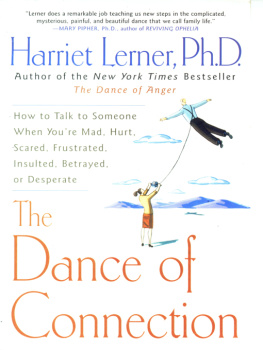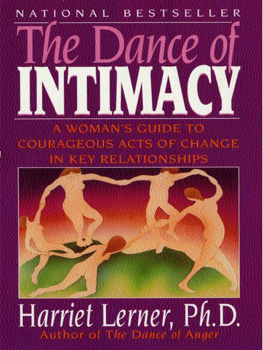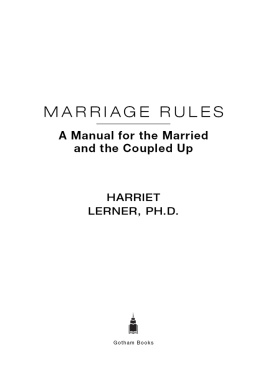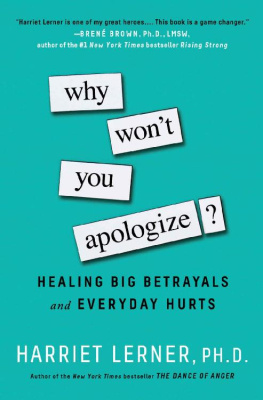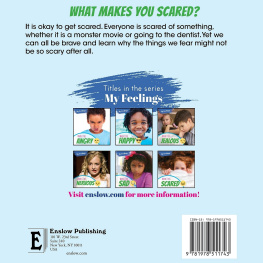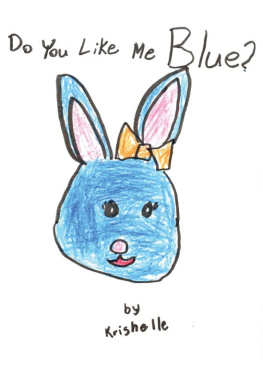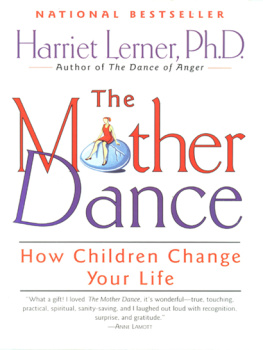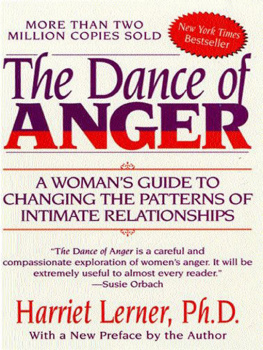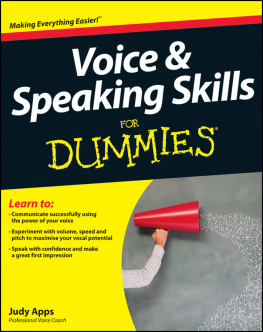T HE D ance of C onnection
How to Talk to Someone When
Youre Mad, Hurt, Scared, Frustrated,
Insulted, Betrayed, or Desperate
Harriet Lerner, Ph.D.

To my best friends
Contents
Back to the Sandbox
Finding Your Voice
Voice Lessons from My Father
Our First Family: Where We Learned (Not) to Speak
Should You Share Vulnerability?
In Praise of Pretending
Putting Our Parents in the Hot Seat
Love Can Make You Stupid
Marriage: Wheres Your Bottom Line?
I Cant Live with This! Voicing the Ultimate in Marriage
Warming Things Up
Silent Men/Angry Women
Criticism Is Hard to Take
An Apology? Dont Hold Your Breath
Complaining and Negativity: When You Cant Listen Another Minute
The Sounds of Silence: Finding a Voice When Youre Rejected and Cut Off
To Thine Own Self Be True
PROLOGUE
Back to the Sandbox
I recently heard a story. Two little kids are playing together in a sandbox in the park with their pails and shovels. Suddenly a huge fight breaks out, and one of them runs away, screaming, I hate you! I hate you! In no time at all theyre back in the sandbox, playing together as if nothing has happened.
Two adults observe the interaction from a nearby bench. Did you see that? one comments in admiration. How do children do that? They were enemies five minutes ago.
Its simple, the other replies. They choose happiness over righteousness.
Grown-ups rarely make such a choice. We have a terrible time stepping aside from our anger, bitterness, and hurt. We know that life is short, but damn it, were not getting back in that sandbox until that other person agrees to having started itand admits to being wrong. Our need to balance the scales of justice is so strong that we lock ourselves into negativity at the expense of happiness and well-being.
A great deal of suffering could be avoided if we could be more like those kids. We could lighten up and let things go. I feel calmed and relieved when my husband knocks at my study door in the middle of a fight, puts his arms around me, and says, I love you. This is stupid. Lets just drop it. Like two kids in the sandbox, were suddenly light and playful again.
Of course, adult life is not always so simple. Some issues need to be revisitednot droppedand talk is essential to this process. We need words to begin to heal betrayals, inequalities, and ruptured connections.
Our need for language, conversation, and definition goes beyond the wish to put things right. Through words we come to know the other personand to be known. This knowing is at the heart of our deepest longings for intimacy and connection with others. How relationships unfold with the most important people in our lives depends on courage and clarity in finding voice. This is equally true for our relationship with our self. Even when we are not being heard, we may still need to know the sound of our own voice saying out loud what we really think.
Our challenge as adults is to develop a strong voice that is uniquely our own, a voice that reflects our deepest values and convictions. Once we are comfortable within that voice, we can bring it to our most important relationships. We can choose to move to the center of a difficult conversionor we can let it go. We can speakor decide not to. Whatever we choose, we can head back to the sandbox with clarity, wisdom, and intention. By doing so, we can strengthen the self and our connections, and have the best chance of achieving happiness during our time with each other.
The thread that unites my work both as an author and as a psychotherapist is my desire to help people speak wisely and well, sometimes about the most difficult subjects. This includes asking questions, getting a point across, clarifying desires, beliefs, values, and limits. How such communication goes determines whether we want to come home or stay away at the end of the day.
This is no simple matter, as glib terms like communication skills or assertiveness training imply. Assertiveness is considered a good ideaif not a cultural ideal. But despite decades of assertiveness training and lots of good advice about communicating with clarity, timing, and tact, we may do our best to speak but still feel unheard. We may find that we cannot affect our husband or wife or partner, that fights go nowhere, that conflict brings only pain rather than an opportunity for two people to learn more about each other. We may have the same dilemma with our mother, sister or uncle, or close friend.
The Limits of Good Communication
We all want to communicate well and make ourselves heard. He just doesnt get it or Shes so critical are sentiments I hear daily in my work. When we speak from the heart, we long for an ear to hear us, and we all have experienced that down feeling when we perceive ourselves as written off or misunderstood.
I wish I could reassure you that reading this book will guarantee that you will finally be heard in your most difficult relationships. Or that strengthening your voice will bring you the love and approval of others. Or that following my good advice will give you a deep sense of inner peace.
Truth is, nothing you say can ensure that the other person will get it, or respond the way you want. You may never exceed his threshold of deafness. She may never love you, not now or ever. And if you are courageous in initiating, extending, or deepening a difficult conversation, you may feel even more anxious and uncomfortable, at least in the short run.
All the assertiveness training and communication skills in the world cant prevent a relationship from becoming fertile ground for silence and stonewalling, or for anger and frustration, or for just plain hard times. No book or expert can protect us from the range of painful emotions that make us human. We can influence the other person through our words and silence, but we can never control the outcome.
That said, what we can learn in the chapters ahead is enormous. We can maximize the chance of being heard and moving relationships forward. We can take a conversation to the next level when the initial foray doesnt bring the desired result. We can stop nonproductive conversational habits so that an old relationship will take a new turn. We can clarify what we feel entitled to and responsible forand what we really want to say. Or, alternatively, we can learn to sit more comfortably with our confusion. We can operate from a solid position of self, even when the other person wont speak to us at all.
TOWARD AN AUTHENTIC VOICE
The challenge of finding an authentic voice within an intimate relationship is far larger than a word like communication can ever begin to convey. Authenticity brings to mind such elusive qualities as being fully present, centered , and in touch with our best selves in our most important conversations. Moving in this direction requires us to clarifyto ourselves and otherswhats important to us. Having an authentic voice means that:
- We can openly share competence as well as problems and vulnerability.
- We can warm things up and calm them down.
- We can listen and ask questions that allow us to truly know the other person and to gather information about anything that may affect us.
- We can say what we think and feel, state differences, and allow the other person to do the same.
- We can define our values, convictions, principles, and priorities, and do our best to act in accordance with them.
- We can define what we feel entitled to in a relationship, and we can clarify the limits of what we will tolerate or accept in anothers behavior.

